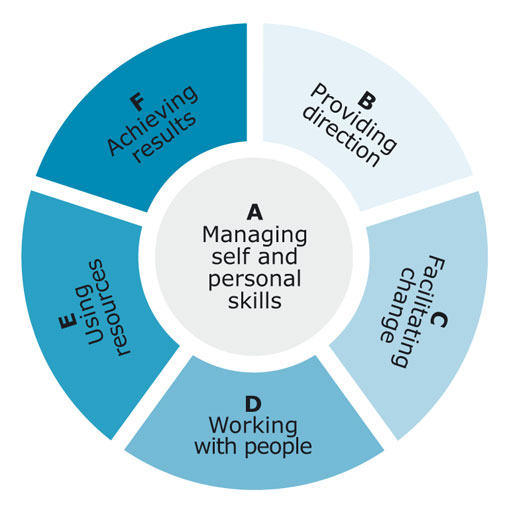6 Your management skills
Imagine always having to work at a level above your capabilities. Alternatively, imagine doing a job that frustrates you because it demands few of your skills. Both situations are likely to be stressful. Thus, matching your own capabilities to the requirements of your management job is important for a variety of reasons.
Which managerial skills and competencies are most frequently used in managerial work? Obviously, the answer to this question will vary enormously from job to job. However, there are recognised ‘sets’ of skills and competencies. One such set of occupational standards for management and leadership has been developed in the UK by the Management Standards Centre. The broad categories of skills and competencies which they cover are shown in Figure 1.
The diagram shows six functional areas (A–F) with Managing self and personal skills having a central position, indicating their contribution to the other five areas of competence. Each area contains a number of ‘units’ of competence, numbering 47 in total. For example, listed under Working with people are 12 ‘units’ set out in Table 2.
| D1 | Develop productive working relationships with colleagues |
| D2 | Develop productive working relationships with colleagues and stakeholders |
| D3 | Recruit, select and keep colleagues |
| D4 | Plan the workforce |
| D5 | Allocate and check work in your team |
| D6 | Allocate and monitor the progress and quality of work in your area of responsibility |
| D7 | Provide learning opportunities for colleagues |
| D8 | Help team members address problems affecting their performance |
| D9 | Build and manage teams |
| D10 | Reduce and manage conflict in your team |
| D11 | Lead meetings |
| D12 | Participate in meetings |
These 12 competencies recognise the importance of the soft skills which managers bring to their role. Overall, the standards are designed to act as a benchmark of best practice.
A simpler scheme of management skills was suggested by Robert L. Katz (1986) in the Harvard Business Review. Katz, who was interested in the selection and training of managers, suggested that effective administration rested on three groups of basic skills, each of which could be developed.
Technical skills. These are specialist skills and knowledge related to the individual’s profession or specialisation. Examples include project management skills for engineers building bridges, aircraft and ships. Katz pointed out that training programmes tend to focus on skills in this area. These skills are easier to learn than those in the other two groups.
Human skills. Katz defines these as the ability to work effectively as a group member and to build cooperative effort in the team a person leads.
Conceptual skills. Katz saw these as being the ability to see the significant elements in any situation. Seeing the elements involves being able to:
- see the enterprise as a whole
- see the relationships between the various parts
- understand their dependence on one another
- recognise that changes in one part affect all the others.
This ability also extends to recognising the relationship of the individual organisations to the political, social and economic forces of the nation as a whole. This has since been called the ‘helicopter mind’, that is, being able to rise above a problem and see it in context. These conceptual skills are likely to be demonstrated by a manager or executive higher in the organisation. Indeed, at these higher levels of management, organisations require these skills.
One area of skill that Katz did not list, but which is becoming increasingly recognised (though often grudgingly) as a basic requirement for managerial effectiveness is a political skill in handling organisational politics. These politics cover pursuit of individual interests and self-interest, struggles for resources, personal conflicts, and the ways in which people and groups try to gain benefit or achieve goals.

